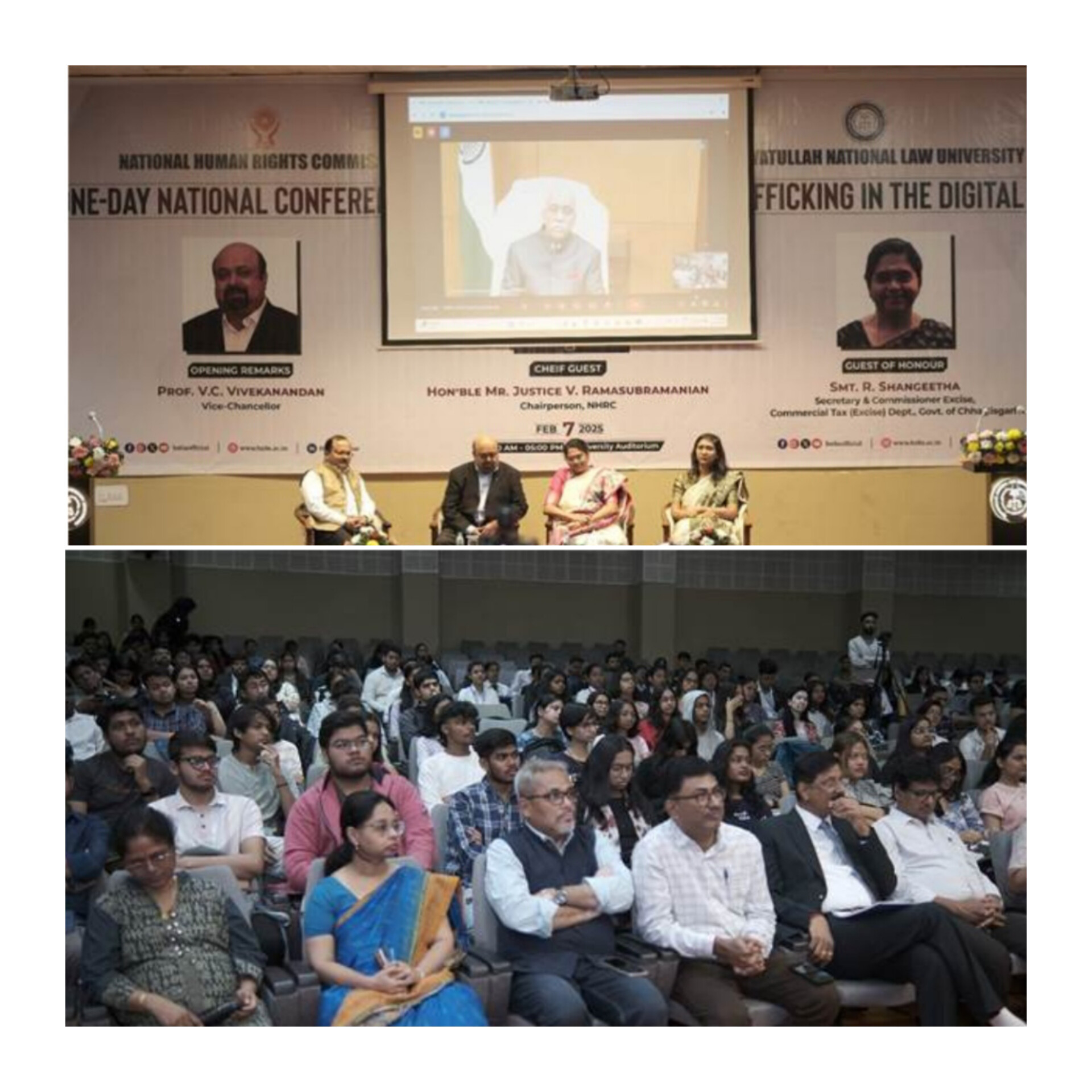NHRC Organizes National Conference on Combating Human Trafficking in the Digital Era.
Raipur, Chhattisgarh:
The National Human Rights Commission (NHRC), India, in collaboration with Hidayatullah National Law University, Raipur, held a significant National Conference on Combating Human Trafficking in the Digital Era. The event, which brought together experts, law enforcement officers, academicians, and activists, focused on the increasing menace of cyber-enabled trafficking facilitated through the internet, social media, and other digital platforms.
In his inaugural address, Justice V. Ramasubramanian, Chairperson of NHRC, India, highlighted the growing concern of human trafficking in the digital space. He addressed the diverse forms of digital trafficking, including sexual exploitation, labour trafficking, organ trafficking, and forced marriages. He also pointed out emerging recruitment strategies such as “Active Recruitment” (Hook Fishing) and “Passive Recruitment” (Net Fishing), where traffickers exploit digital tools to deceive and lure vulnerable individuals.
Justice Ramasubramanian underscored the importance of raising public awareness regarding digital safety. He called for stronger regulatory and institutional frameworks, alongside technological solutions, to combat the misuse of digital spaces for trafficking.
Conference Insights and Discussions
The conference featured two thematic sessions. The first session, “The Role of the Internet in Facilitating Human Trafficking and Migrant Smuggling: A Legal, Administrative, and Regulatory Perspective,” provided a deep dive into the ways digital anonymity is being used to perpetrate human trafficking. Chaired by Bhamathi Balasubramanian (IAS, Retd.), the session explored factors contributing to trafficking, including gendered dimensions, migrant smuggling networks, and the role of social media in recruiting victims. Experts also focused on trafficking cases from Chhattisgarh, emphasizing the need for better reporting systems and enhanced coordination between Anti-Human Trafficking Units (AHTUs).
The second session on “Preventive Strategies Against Human Trafficking: Role of Technology, Law Enforcement Agencies, Victim Support, and Community Engagement” emphasized the critical role of collaboration between technology, law enforcement, and the community in addressing trafficking. Experts called for stronger victim support systems, improved training for AHTUs, and a heightened focus on using artificial intelligence and digital forensics in trafficking investigations.
Key Recommendations and Suggestions
The conference brought forward several vital recommendations to curb human trafficking in the digital age. Some of the key proposals include:
- Amend the Immoral Traffic (Prevention) Act (ITPA) to provide clear distinctions between child and adult trafficking, with provisions to address cyber trafficking.
- Formalize a linkage between the ITPA and the Information Technology (IT) Act to close existing legal gaps and address trafficking in the digital realm.
- Increase awareness of self-reporting portals, such as the Centralized Complaint and Prevention of Women and Children (CCPWC), to encourage public participation in trafficking case reporting.
- Strengthen AHTUs by equipping them with necessary training and resources to combat digital trafficking.
- Improve data collection on human trafficking across various categories to better inform policy decisions and intervention strategies.
- Promote community engagement to help local communities play a proactive role in preventing and reporting trafficking crimes.
In his concluding remarks, Joginder Singh, Registrar (Law) at NHRC, emphasized that combating human trafficking requires a collective effort from governments, non-governmental organizations, technology companies, and the public. The conference successfully highlighted the growing intersection between technology and trafficking, offering a platform for collaborative solutions to fight this global issue.
The conference, marking a pivotal step in addressing the evolving challenges of human trafficking, called for an integrated approach involving law enforcement, technology, policy reform, and community-based interventions.



